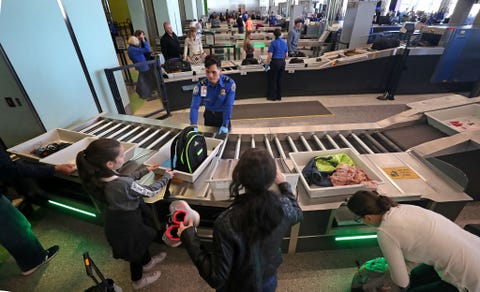The TSA Has Released a Plan to Bring Facial Scanning to Every Airport
It'll take a few years to be fully implemented, and the usual disclaimers about privacy apply.
By Sam Blum
GETTY IMAGES/BOSTON GLOBE
The Transportation Security Administration (TSA) released its official plan for rolling out a nationwide facial scanning program in lieu of traditional ID cards and boarding passes on Tuesday.
The agency's TSA Biometrics Roadmap for Aviation Security and the Passenger Experience seeks to bolster security checkpoints with a layer of biometric security. The TSA has consistently worked on the project over the last couple years, first scanning the finger prints of TSA Precheck customers at Hartsfield–Jackson Atlanta International Airport and the Denver International Airport in 2017.
Working in concert with the U.S. Customs and Border Protection (CBP ), the agency implemented facial scanning for travelers landing on U.S. soil at JFK international Airport in New York in 2017, and later expanded the project to Los Angeles International Airport this year. Later this month, TSA and CBP will partner with Delta Air Lines to launch the first biometric airport terminal in the country, also at Atlanta's Hartsfield-Jackson, automating "many processes in the travel experience, from self-service bag drop, to ID verification, to boarding a flight," the agency writes in a press release.
TSA's biometric security protocol was previously confined to TSA Precheck and international travelers entering U.S. soil, but Tuesday's announcement outlines a plan to expand the effort to all domestic travelers. Starting last month, all Precheck members were required to provide a photograph, which the agency will use for facial scans. The TSA hopes to expand the effort for all domestic travelers, using automation to identify them from passport and visa photos. CPB first illustrated this so-called Biometric Pathway—a system in which all travelers entering and leaving the U.S. would undergo facial scans—last year.
Of course, the plan has already sparked ire from a privacy standpoint. Jeramie Scott, national security counsel for the Electronic Privacy Information Center, told the Washington Post last June:
“It’s a technology that can easily be used for mass, indiscriminate surveillance...Any use for facial recognition for something like this — where it’s the government or companies running a facial recognition search on people — needs to be scrutinized very closely by the public, because of the serious risk of mission creep.”
Source: TSA, The Verge
No comments:
Post a Comment